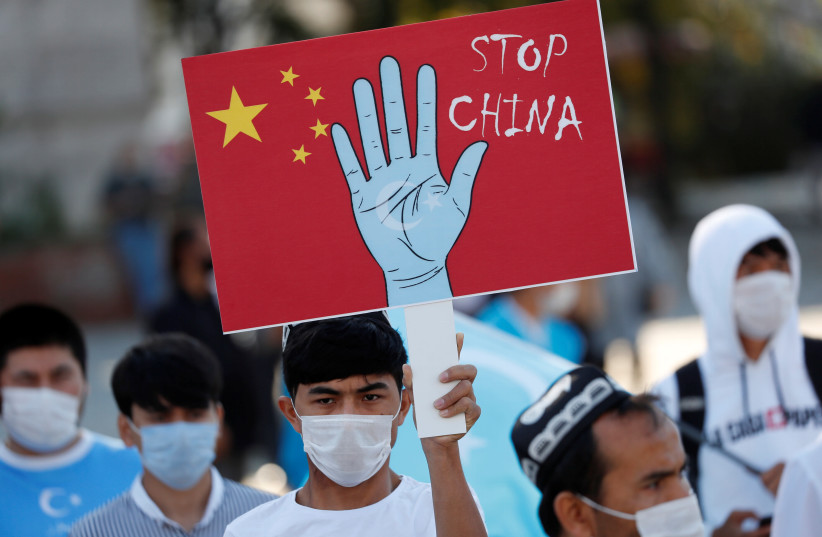Back in 2007 two American academics authored a book about "The Israel Lobby and US Foreign Policy," slamming Israel-US relations. One of the authors, John Mearsheimer, later went on to give a bizarre lecture focusing on Israel and American Jews.
He spoke about “the future of Palestine, and by that I mean the future of the land between the Jordan River and the Mediterranean Sea, or what was long ago called Mandatory Palestine.” He went on to note that “American Jews who care deeply about Israel can be divided into three broad categories. The first two are what I call ‘righteous Jews’ and the ‘new Afrikaners,’ which are clearly definable groups that think about Israel and where it is headed fundamentally.”
This bizarre lecture was one more stop on an obsessive critique of Israel and its policies. He said during his 2010 lecture on the “new Afrikaners” that “nevertheless, the Palestinians are not going to get their own state any time soon. They are instead going to end up living in an apartheid state dominated by Israeli Jews.” At the time Mearsheimer was identified as the “R. Wendell Harrison Distinguished Service Professor of Political Science and co-director of the Program on International Security Policy at the University of Chicago.”
Now he has authored a new piece at Foreign Affairs titled “The Inevitable Rivalry: America, China, and the Tragedy of Great-Power Politics.” He starts out by noting that “three decades ago, the Cold War ended, and the United States had won. It was now the sole great power on the planet. Scanning the horizon for threats, US policymakers seemed to have little cause for concern—and especially not about China, a weak and impoverished country that had been aligned with the United States against the Soviet Union for over a decade. But there were some ominous signs.”
Mearsheimer has warned for years about China’s rise. Back in 2015, a review of his work noted “Mearsheimer believes that containment is the United States’ only way to prevent China from achieving regional hegemony.” He continued to warn about China while slamming Israel.
In the new piece, Mearsheimer argues that “engagement [with China] may have been the worst strategic blunder any country has made in recent history: there is no comparable example of a great power actively fostering the rise of a peer competitor. And it is now too late to do much about it.”
The expert’s concern is that US policymakers failed to contain the rapid rise of China. Now China could be even more powerful than the Soviet Union once was, the article argues, according to Foreign Affairs. In his article, he focuses on how they embraced a liberal international world order but ignored the rise of China.
It also ignored how embracing China didn’t make China a liberal democracy but actually China “grew even more repressive and ambitious as it rose.” Indeed, the world is now seeing that aspect of China today. Now a dangerous security competition is developing between the US and China, he argues. “Washington let technology flow with few limits, allowing China to challenge US dominance in the critical realm of innovation.” Now it may be “too late to do much about it.”
Max Abrahms, an international security professor, noted that “some scholars were too busy writing books about the dangers of the US-Israeli relationship.” This points out that Mearsheimer was busy talking up the Israel Lobby and also slamming the “new Afrikaners” as China was rising.
While some might say there is no contradiction in slamming Israel’s policies while also arguing that the US didn’t take China’s rise seriously enough, others might wonder why some advocated redressing the Israel-US relationship at a time when the US needs allies and partners in any global struggle with China.
The Israel Lobby book argued that “no lobby has managed to divert US foreign policy as far from what the American national interest would otherwise suggest, while simultaneously convincing Americans that US and Israeli interests are essentially identical” and that the lobby has resulted in "Israel's enemies get weakened or overthrown, Israel gets a free hand with the Palestinians, and the United States does most of the fighting, dying, rebuilding, and paying.”
In the original paper in which they slammed Israel, the authors of the Israel Lobby argued in 2006 that “this is taken to mean not only that Washington should give Israel a free hand in dealing with the Palestinians and not press it to make concessions until all Palestinian terrorists are imprisoned or dead, but that the US should go after countries like Iran and Syria. Israel is thus seen as a crucial ally in the war on terror because its enemies are America’s enemies. In fact, Israel is a liability in the war on terror and the broader effort to deal with rogue states.”
In 2006 the authors argued that Syria had lost its “Soviet patron.” In fact today Russia is deeply backing Syria and Syria is on the way to winning a ten-year civil war with Russia’s backing.
The authors seem to critique Israel for being a strong military power and note that while advocates think the US should back a fellow democracy like Israel, “the US has overthrown democratic governments in the past and supported dictators when this was thought to advance its interests – it has good relations with a number of dictatorships today.”
The 2006 article that formed the basis for the book argued that “American Jewish leaders often consult Israeli officials, to make sure that their actions advance Israeli goals.” They argued, “the Israeli government and pro-Israel groups in the United States have worked together to shape the administration’s policy towards Iraq, Syria and Iran, as well as its grand scheme for reordering the Middle East.” The article painted a picture of US “neo-conservatives” with ties to Israel leading the drive to war against Iraq in 2003.
The authors noted “one might argue that Israel and the Lobby have not had much influence on policy towards Iran, because the US has its own reasons for keeping Iran from going nuclear. There is some truth in this, but Iran’s nuclear ambitions do not pose a direct threat to the US. If Washington could live with a nuclear Soviet Union, a nuclear China, or even a nuclear North Korea, it can live with a nuclear Iran.”
If only Syria could be a US ally, the 2006 article seemed to argue. “Equally worrying, the Lobby’s campaign for regime change in Iran and Syria could lead the US to attack those countries, with potentially disastrous effects. We don’t need another Iraq. At a minimum, the Lobby’s hostility towards Syria and Iran makes it almost impossible for Washington to enlist them in the struggle against al-Qaida and the Iraqi insurgency, where their help is badly needed.”
Now many of those fantasies about the US working with Syria’s regime have passed. The US did work on the same side as Iran against ISIS in Iraq, but that didn’t make Iran a US ally. Now Mearsheimer appears more concerned about China. It’s unclear how his arguments against the US-Israel relationship would have helped in the long term regarding his concerns about China. Weakening Israel and the US working with Iran and Syria would not likely have reduced China’s rise. Today Israel has more friends in the Middle East, especially among key US partners in the Gulf and in Greece and India. It’s not clear how pushing Israel out of the US system of allies and partners would have helped the US in the long run regarding China. It appears in retrospect that obsession with Israel and the “lobby” was not in US “interests,” and there is no evidence weakening Israel and working with countries like Syria would have helped US interests in the Middle East.
The wider question regards a divide in US foreign policy that goes back to the 1950s. While some have argued that Israel was a “liability” or that US support for Israel antagonized potential US friends in the region, others have seen Israel as a cornerstone of the US security network in the region and the world. In general, the argument that the US should have jettisoned Israel to work with hostile extremist regimes doesn’t seem like it would have worked. Why should the US have preferred Saddam Hussein’s regime, spreading war and gassing minorities, to Israel. Would Nasser’s regime have been preferable, or the Muslim Brotherhood and extremists that ended up with Al Qaeda. Extremist regimes have tended to become weak, chaotic states, like Pakistan after Zia ul-Haq, or Turkey under Erdogan. Moderate, stable states have been more helpful in projecting security. Why would the US have been better served by working with Iran, rather than working closely with Israel.
Israel has become a tech innovator and Israeli technology helps US forces. Consider the role of the Trophy system for US tanks or Iron Dome, or other systems Israel makes that are now part of the helmets of F-35 pilots, or the wings on F-35s. All of this shows that US-Israel cooperation on various fronts, including now countering drone threats, is important.
There’s no evidence that had the US pivoted to Iran and Syria that it would have received Iranian defense tech that would help US tanks or that Syria would have built an Iron Dome system. The fact is that Syria and Iran are close to Russia and China and were never going to be US allies. Rather than sunk costs there, the US worked closely with Israel and prospered.
In the long run, the US is drawing down its footprint in the region and has left Afghanistan. That makes Israel’s partnership more crucial. Would some experts have preferred the US drawdown while having the Assad regime as its ally and partner in the region? If the US is to confront China in the next decades, the ability to rely on a strong Israel has been borne out.

